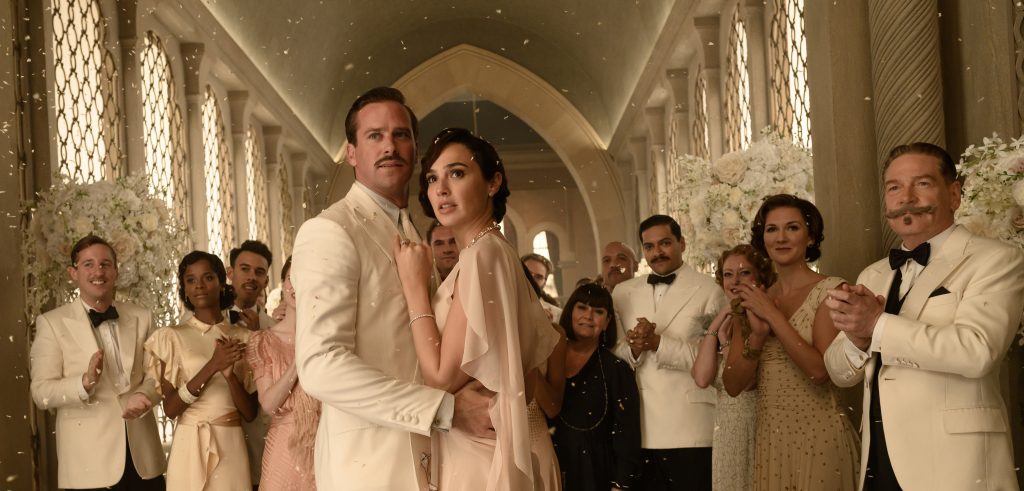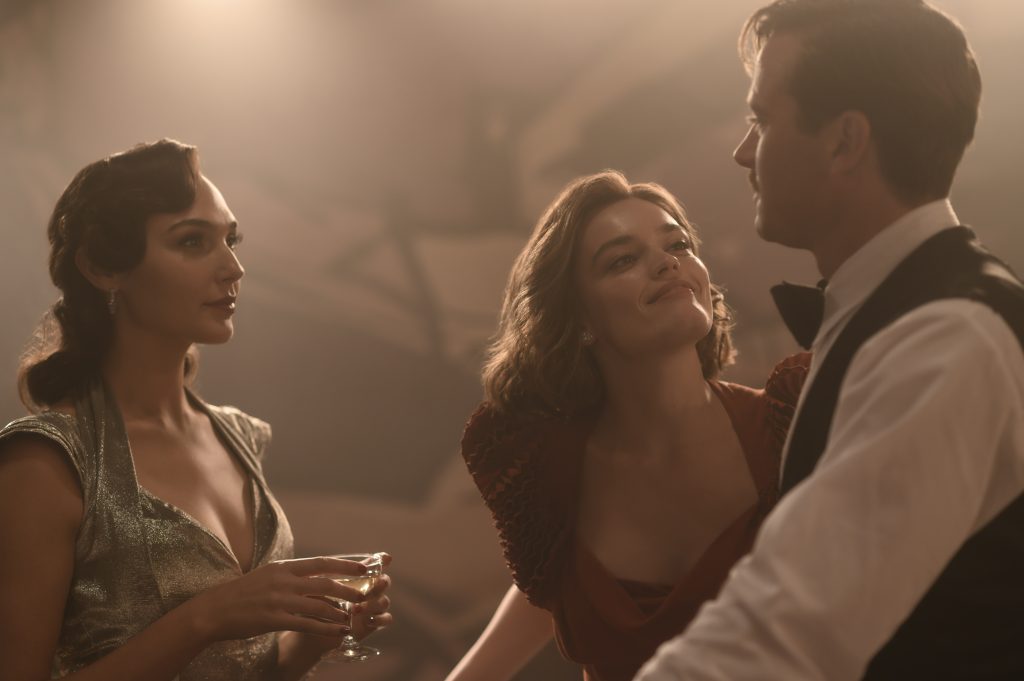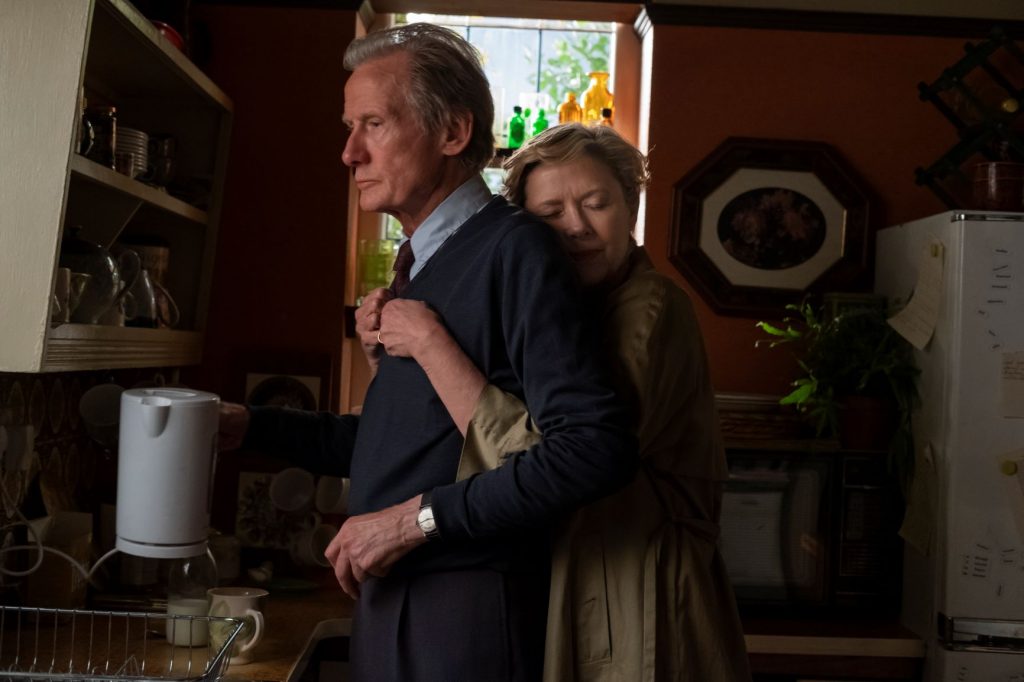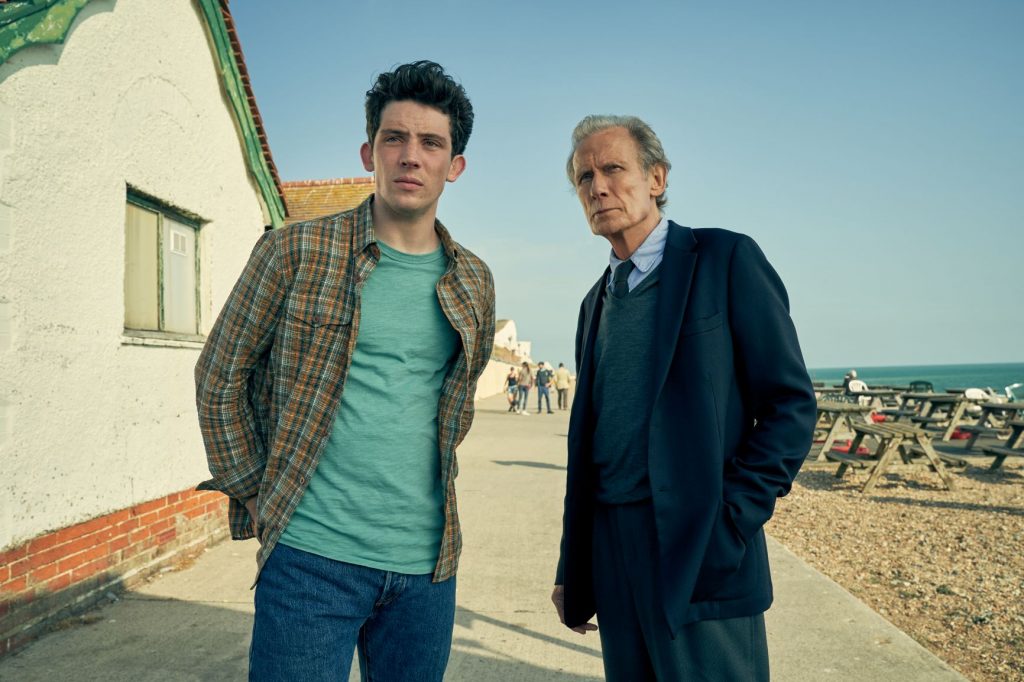February 7, 2022
by Carla Hay

Directed by Kenneth Branagh
Some language in French with subtitles
Culture Representation: Taking place primarily in 1937 in Egypt and England (and briefly in 1914 in Belgium), the dramatic film “Death on the Nile” features a predominantly white cast of characters (with a few black people and Asians) representing the working-class, middle-class and wealthy.
Culture Clash: Celebrated detective Hercule Poirot gets involved in a murder mystery that happens during a glamorous newlywed couple’s honeymoon trip to Egypt, and all of the suspects are the couple’s friends, associates and enemies who are on the trip.
Culture Audience: “Death on the Nile” will appeal mainly to people who are fans of Agatha Christie novels, murder mysteries and the stars of this movie.

Stylish and suspenseful but with some occasional missteps, the 2022 remake of “Death on the Nile” should satisfy fans of retro murder mysteries. The movie stands out for giving famed detective Hercule Poirot more of a personal backstory. Kenneth Branagh, who stars as Poirot and leads the all-star cast, is the director of the 2022 version of “Death on the Nile,” which was written by Michael Green and is based on Agatha Christie’s 1937 novel of the same name. The book was also made into a 1978 movie that also had a star-studded cast that included Peter Ustinov, Bette Davis, Mia Farrow, David Niven, Maggie Smith, Angela Lansbury and George Kennedy.
“Death on the Nile” centers on a murder mystery that takes place during a wealthy newlywed couple’s honeymoon cruise to Egypt. The 2022 movie version of “Death on the Nile” makes some significant changes in the cast of characters from the book and the 1978 movie. There are slightly less people in the group of suspects, and the group has racial diversity that was missing from the book and the 1978 movie. Branagh, Green and most of the same team of producers (including Branagh) who made 2017’s “Murder on the Orient Express” (another movie remake of an Agatha Christie novel starring Hercule Poirot) are also behind the 2022 version of “Death on the Nile.”
Belgian detective Poirot has been a bit of a mystery himself, but the 2022 version of “Death on the Nile” makes a bold move to expose his vulnerabilities, by opening with a flashback scene that shows his personal life before he became a famous private investigator. It’s October 31, 1914, and Poirot is on a World War I battlefield with a group of soldiers near the Yser Bridge in Belgium. Through his highly intelligent deduction skills, Poirot is able to suggest an attack strategy that ends up saving the lives of his military comrades.
Captain Rens (played by Orlando Seale), the group leader, praises Poirot, by saying: “You were right, Poirot. You’re too smart to be a farmer.” But then, tragedy strikes when Captain Rens walks somewhere on the battlefield that accidentally triggers a booby-trap bomb, and he is instantly killed.
Poirot is severely injured in the blast, and he ends up in a hospital. A bedridden Poirot is visited in the hospital by his fiancée Katherine (played by Susannah Fielding), who comforts him because Poirot blames himself for Captain Rens’ death. There’s another reason why Poirot is so despondent: The right side of face has been severely disfigured.
Poirot, who had plans to be a farmer after he got out of the military, tells Katherine that he will understand if she no longer wants to marry him and end their relationship. Katherine professes her undying loyalty to Poirot and tries to cheer him up. She says about covering up his large facial scar: “Simple: You’ll grow a moustache.” And in that moment, it’s explained why Poirot has an unusually large moustache that curls over his face cheeks.
The movie then fast-forwards to London in 1937. A famous nightclub frequented by celebrities is having an eventful night. World-famous socialite/heiress Linnet Ridgeway (played by Gal Gadot) has arrived at the nightclub to much fanfare and media attention. Also at the nightclub are an attractive, newly engaged couple named Jacqueline “Jackie” de Bellefort (played by Emma Mackey) and Simon Doyle (played by Armie Hammer), who both love being in glamorous company but are struggling financially.
Jackie and Linnet have known each other since they went to the same high school, but they haven’t stayed in touch and haven’t seen each other in a while. Simon is unemployed and looking for work. Jackie is hoping that Linnet will offer Simon a job in Linnet’s real-estate ventures.
When Jackie and Linnet see each other for the first time in years, they greet each other warmly. Jackie introduces her fiancé Simon to Linnet and boasts about how intelligent and capable he is in real estate development. Jackie asks Linnet to hire Simon. And as encouragement for Linnet to see how charming Simon is, Jackie tells Simon that he should dance with Linnet.
As soon as that happens, you know what’s going to come next: Simon and Linnet dance together, and there’s noticeable chemistry between them. Jackie notices it too, and she looks a little bit wary and uncomfortable.
The nightclub’s entertainment for the evening is an American blues singer named Salome Otterbourne (played by Sophie Okonedo), a talented entertainer who hides her streetwise toughness behind a seductive Southern drawl. (Okonedo is a very good singer, by the way.) Salome’s manager is her niece Rosalie Otterbourne (played by Letitia Wright), who is first seen demanding that the nightclub owner/manager Monsieur Blondin (played by Rick Warden) pay Salome’s entire fee up front, before Salome performs.
Monsieur Blondin tries to act like he won’t pay until after the performance, but Rosalie stands firm and gets what she wants. Rosalie tells him that nightclub owners have a way of suddenly being “broke” and unable to pay an entertainer who performed in the club. This exchange is a nod to what many entertainers had to go through to avoid getting ripped off by unscrupulous promoters and venue owners who tried to cheat entertainers out of their rightful payment. No one brings up race in this movie, but the implication is that these ripoffs happened to black entertainers more than white entertainers.
The characters of Salome and Rosalie represent two of the biggest changes in the 2022 version of “Death on the Nile.” In the book and in the 1978 movie, Salome and Rosalie are both white characters, with Salome being a romance novelist and Rosalie being Salome’s daughter. The 2022 version of “Death on the Nile” presents Salome as very forward-thinking and progressive to make her niece her manager, since it was very unusual in 1937 for a young black woman to be a talent manager in the entertainment business.
After this nightclub scene, “Death on the Nile” then fast-forwards six weeks later. Simon and Linnet are now newlyweds who are honeymooning in Egypt. (The movie never shows their courtship.) The honeymoon includes a cruise on the Nile River. What happened to Jackie? She’s become a bitter and jilted ex-lover who has been stalking Linnet and Simon.
Poirot is in Egypt too, traveling alone. He’s taking in the sights of a pyramid when he sees his young friend Bouc (played by Tom Bateman) flying a kite on the pyramid. (Bouc was also in “Murder on the Orient Express,” since he is the nephew of the Orient Express’ owner.) Bouc and Poirot are happy to see each other and marvel at how much of a coincidence that they are both in this remote area.
Poirot’s encounter with Bouc is how he finds out that Bouc and his domineering, wealthy mother Euphemia Bouc (played by Annette Bening) are guests who were invited to be on Linnet and Simon’s honeymoon party trip. All of the guests have gathered at the same hotel before they embark on the cruise on the Nile.
And what a coincidence: Poirot is staying at the same hotel too. And he gets invited to be a part of this honeymoon party. Also invited are Salome and Rosalie, because Linnet was so impressed with Salome’s nightclub performance, Linnet hired Salome to be the entertainment for this honeymoon trip. Another member of this honeymoon entourage is Linnet’s loyal business trustee Katchadourian (played by Ali Fazal), who was a white man named Andrew Pennington in the book and 1978 movie. In the 2022 version of “Death on the Nile,” Katchadourian is also Linnet’s cousin.
Also along for the trip are Linnet’s quiet and timid maid Louise Bourget (played by Rose Leslie); Linnet’s feisty socialite godmother Marie Van Schuyler (played by Jennifer Saunders); Marie’s dutiful nurse Miss Bowers (played by Dawn French); and Linnet’s ex-fiancé Dr. Windlesham (played by Russell Brand), a medical physician whom Linnet dumped to be with Simon. When Poirot later asks Dr. Windlesham why he agreed to go on this potentially awkward honeymoon trip, Dr. Windlesham replies that Linnet invited him and he couldn’t say no to her.
Bouc introduces Poirot to Simon and Linnet. In a private conversation, Linnet tells Poirot about the stalking problem that she and Simon have with Jackie. Linnet wants to hire Poirot to get Jackie to stop stalking the couple. However, when Poirot asks Linnet if Jackie has made any threats, Linnet says no and admits that all Jackie does is show up in the same places and Simon and Linnet and stare at them.
Poirot is candid in telling Linnet that Jackie technically isn’t breaking the law, because Jackie hasn’t made any threats and because Jackie is not trespassing in the public places where she follows Simon and Linnet. However, Poirot agrees to talk to Jackie the next time that he sees her and promises to try to convince Jackie to stop following Simon and Linnet. Somehow, Jackie found out about this cruise, so she’s booked on the same cruise ship as the honeymoon party group.
Linnet also confides in Poirot that she doesn’t feel safe in this group of people she’s invited on her honeymoon. “When you have money, you have no friends,” Linnet says with jaded sorrow. Linnet tells Poirot that she constantly feels as if she’s in danger. It’s a foreshadowing of what will eventually happen to Linnet.
When Poirot meets Jackie for the first time, it’s on the cruise ship. He finds out in their private conversation that Linnet has outshined Jackie, ever since they were in high school together. As an example, Jackie remembers how Linnet replaced Jackie in the Cleopatra role of a school production of “Antony and Cleopatra.” Poirot tactfully tells Jackie that she should move on with her life and let Simon and Linnet be happy together. But Jackie insists, “Simon loves me! A love that fierce doesn’t vanish!”
Poirot then opens up to Jackie about his own heartbreak, when he talks about how he thought he couldn’t live after the end of a love affair with a woman he considers to be his soulmate. He’s obviously talking about Katherine, but what happened to Poirot and Katherine is hinted at and not fully divulged in the movie. Poirot’s eyes tear up when he talks about her, and it’s a rare moment when he shows how emotionally damaged he’s been by this heartbreak.
You don’t have to be a psychiatrist to speculate that Poirot’s eccentricities and his decision to go into detective work instead of being a farmer perhaps had a lot to do with how he was affected by the end of his romance with Katherine. Poirot is famously obsessive-compulsive. His insistence on sticking to certain habits and believing in certain superstitions are indications that he wants to maintain some type of control in his life. There’s a scene in the movie where Poirot is given seven tiny desserts to eat at his dining table, and he asks that one of the desserts be taken away because he only wants to have an even number (not an odd number) of dishes on the table.
And who gets murdered in “Death on the Nile”? It’s not spoiler information (since it’s common knowledge) that Linnet is found dead of a gunshot wound, in her bed on the cruise ship. A valuable necklace of hers also goes missing around the same time. (In the book and 1978 movie, it’s a pearl necklace. In the 2022 movie, it’s a yellow diamond necklace.) And Poirot immediately begins his investigation to find out who’s responsible for Linnet’s murder. Linnet won’t be the only person to die during this ill-fated trip.
The 2022 movie version of “Death on the Nile” takes some liberties with reality, because during this entire investigation, the ship’s officials aren’t shown getting involved in this murder investigation. And for the purpose of streamlining the story, there are less people who are investigated than there would be in real life, when anyone on the ship could be considered a person of interest, until proven otherwise. Conveniently, Linnet reserved the entire ship for herself and her entourage. But unrealistically, no one in the ship’s staff is questioned during this investigation.
The 2022 “Death on the Nile” eliminates, condenses or makes other changes to certain characters that were in the book and the 1978 movie. What hasn’t changed is that all of the suspects are people who knew Linnet. In addition to having more racial diversity, the 2022 version of “Death on the Nile” has LGBTQ representation in a subplot that won’t be revealed here. It should come as no surprise that Poirot is the one who figures out certain people’s secrets.
In the book and in the 1978 movie, Marie Van Schuyler and Miss Bowers are American, but they are British in the 2022 version of “Death on the Nile.” The book and the 1978 movie both had a character that’s not in the 2022 movie: an outspoken Communist named Mr. Ferguson. In a divisive political climate, it’s easy to see why the filmmakers of the 2022 “Death on the Nile” wanted to avoid politics in this movie remake.
The 1978 movie and book had a character named physician Dr. Bessner (who was Austrian in the book and Swiss in the movie), but the Dr. Bessner character is not in the 2022 movie. The Dr. Windlesham character seems to be a substitute for the Dr. Bessner character, since Dr. Windlesham is the only one on the ship who can determine the cause of death and the estimated time of death. Meanwhile, the book has other characters that aren’t in either movie, such as attorney Jim Fanthorp, Italian archaeologist Guido Richetti and Marie’s cousin Cornelia Robson.
Branagh’s 2017 version of “Murder on the Orient Express” got some criticism for having a group of suspects that was too large and unwieldy. It might be why his 2022 version of “Death on the Nile” has a smaller ensemble cast that’s less likely to confuse or distract movie audiences, compared to a murder mystery with a larger group of suspects. Fans of Christie’s “Death on the Nile” novel shouldn’t be disappointed by these changes. Having a smaller ensemble cast than “Murder on the Orient Express” and the 1978 version of “Death on the Nile” gives the 2022 version of “Death on the Nile” more room to focus on the individual personalities of this intriguing group of suspects.
Viewers find out that Bouc, who is a friendly and open person, is in love with someone he wants to marry, but his paramour doesn’t have his mother Euphemia’s approval. Bouc is a self-admitted “mama’s boy” who desperately craves his mother’s approval and relies on her money for financial support, which she threatens to cut off if he marries the woman he loves. Euphemia is extremely bitter and cynical about love and marriage, because she repeatedly says that there’s no such thing as a happy marriage, and love usually ends in heartbreak.
Salome knows a thing or two about failed marriages, because when Poirot asks her about her personal life, she has this sassy reply: “I’ve had a handful of husbands. My husbands were a handful.” It eventually becomes obvious that uptight Poirot and free-spirited Salome have “opposites attract” feelings for each other. Whether or not it turns into a romance is hinted at in a “to be continued” manner. It’s another way that this movie shows Poirot as someone other than the rigid, enigmatic, asexual investigator that he’s presented as in the books and other movies about him.
As a movie that’s set mostly in Egypt, “Death on the Nile” has some visually stunning scenes of pyramids and the Nile River. The cinematography and production design are above-average for the most part, but sometimes the lighting is uneven or unflattering. For example, there are several interior scenes where the cast members’ faces look too shiny, as if they’re about to break out into a sweat. These are noticeable flaws that don’t take away from the overall enjoyment of the movie.
Viewers will find plenty of entertainment and thrills in “Death of the Nile,” although some of the characters aren’t fully developed. Linnet’s maid Louise often fades into the background. Linnet’s ex-fiancé Dr. Windlesham literally is a silent observer in the background for half of his screen time, until after Linnet’s murder when he suddenly becomes a talkative medical examiner.
Branagh authentically shows more emotional depth as Poirot, for the reasons stated earlier, which makes his performance in “Death on the Nile” much more interesting than in “Murder on the Orient Express.” Mackey handles her complex role well as Jackie, who is someone whom audiences can either pity or dislike, sometimes at the same time.
Gadot’s performance as Linnet is a little on the shallow side, while Hammer gives Simon a “plastic playboy” vibe of someone who’s accustomed to being the heartbreaker in a relationship. Are they believable as a couple who fell so passionately in love with each other that they got married within six weeks of meeting each other? Not really, but anyone who breaks off a marriage engagement to marry someone else within six weeks is someone who probably has self-centered tendencies. In that regard, Linnet and Simon are a superficial and vain couple that this story intended them to look like.
The rest of the cast members are perfectly fine in their roles. Some of the movie’s best lines are said by Salome, Euphemia and Marie: three strong-willed and outspoken women who, under different circumstances, might’ve had a great time together if they became friends. “Death on the Nile” has most of the main characters, including Poirot, rethinking perceptions of themselves and other people. It’s why this movie is more than a murder mystery. It’s also a thoughtful commentary on how death can change people’s life priorities.
20th Century Studios will release “Death on the Nile” in U.S. cinemas on February 11, 2022.


